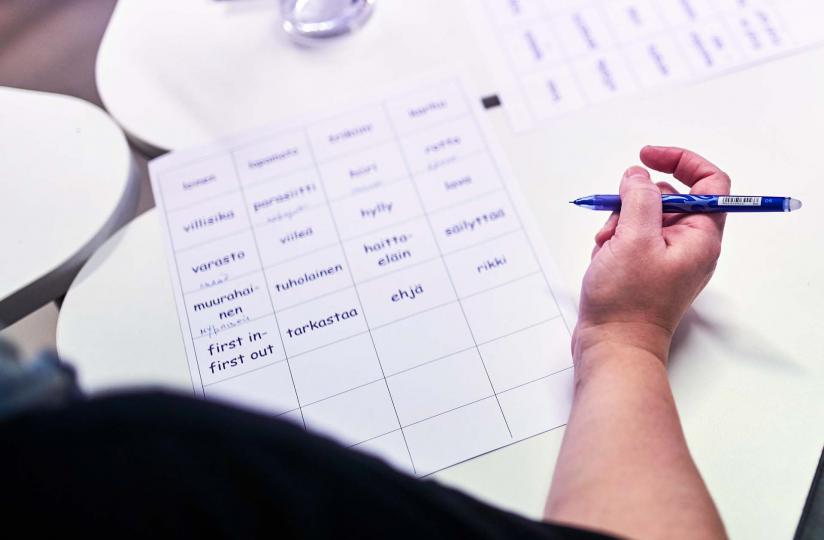Personalisation of studies means that a study path is planned and implemented for each vocational education student according to their needs. In vocational education and training, the study path is individual and flexible.
Personalisation
- identifies and recognises your existing skills
- involves career planning
- includes planning how to acquire your missing skills (content, schedules and methods)
- the guidance and support you need, taking into account your life situation
- how and when you will demonstrate your skills
Your individual plan is recorded in your personal competence development plan (PCDP). You will prepare the PCDP together with your coordinating teacher, and it will be updated flexibly throughout your studies. If necessary, other teaching and guidance personnel can also participate in the preparation of the PCDP. If you are a minor, your guardian may participate in the preparation and updating of the PCDP.
Tips and guidelines for preparing for the PCDP discussion
Before the PCDP discussion, familiarise yourself with your qualification
In the PCDP discussion, you have the opportunity to:
- have a confidential conversation with your coordinating teacher
- share your interests and future plans
- plan your own study path together with your coordinating teacher
- highlight your previously acquired skills (e.g. studies, work or hobbies, volunteering, positions of trust, civil or military service, business activities)
- describe your need for guidance and support (which are recorded in Wilma before the start of studies => Ohjaus ja tuki (Guidance and support) tab => Muut asiakirjat (Other documents) => Lisää uusi (Add new) => Opiskeluvalmiuksien tunnistuslomake (Identification form for study skills))
- receive information on what kind of guidance and support you can get for your studies
- ask about study-related matters
ertificates and other documents
Please scan your previous study and employment certificates and upload them to Wilma before starting your studies. The certificates can be used to identify and recognise your skills. (Instructions for logging in to Wilma and scanning the certificates have been sent to you by e-mail). If you are unable to upload your certificates to Wilma, bring them with you to your first PCDP discussion.
Things to consider in advance
- What kind of competence have you previously acquired?
- What are you like as a student?
- How and in what kind of environment do you learn best?
- How have your previous studies gone?
- What are your strengths?
- What kind of support and guidance have you received in the past?
- What kind of support and guidance do you want for your studies?
- What kind of expectations do you have about your studies?
- What are your dreams and plans for the future?
Identification of prior learning
Everything you know is valuable. Identification of learning means that the competence you have previously acquired will be determined. For example, you may have accumulated competence in the form of knowledge and skills learned through work experience, hobbies, military or civil service, studies abroad, separate qualifications, parts of previous qualifications and degrees or parts thereof, upper secondary general education, folk high schools and adult education centres, or you may have other previously acquired learning. Competence can be identified based on the documents you present and other reports (competence survey, interviews or other methods).
Recognition of prior learning
If you have valid vocational education qualifications or units, they can be used directly for your studies. If you have outdated training and otherwise up-to-date skills, your skills can be recognised and evaluated. If you have otherwise accumulated competence in accordance with professional requirements or competence objectives, for example through work experience, you can be scheduled directly for a demonstration.
Career planning
As part of personalisation, career planning is carried out with you. Your goals, plans for further studies or entering and progressing into working life are all recorded in your career plan. The goal of career guidance is to support you in reflecting on your own interests and to help you set goals for your career. Career planning is done by a designated responsible teacher and guidance counsellor in cooperation with you.
Acquisition of skills
You are studying what you do not yet have competence in. To the extent that you lack competence in accordance with professional requirements or competence objectives, you plan together with the designated teacher or other guidance personnel what additional competence you need, how to acquire it and in what timeframe. At the same time, the guidance and support you need, special support if necessary, and any studies that support your study skills are also planned. This will build your own personal study path. The acquisition of skills is always planned unit-specifically.
Feedback on competence development
As a student, you have the right to receive feedback on the development of your competence during education. You will receive feedback on the development of your competence from the instructing teachers, other teaching staff and your workplace instructor orally and in writing. Feedback guides and encourages you in achieving your goals and improves your self-assessment skills. Based on the development of your competence, your personal competence development plan (PCDP) will be flexibly updated as necessary during the education.
Demonstration of competence
Once you have achieved the key skills or competencies defined in the qualification curriculum, you will demonstrate your skills by performing practical work tasks in genuine work situations and processes in the workplace. You can participate in demonstrations regardless of how you acquired the skills. Demonstrations are always individually designed unit-specifically by you, the competence assessor and a representative from working life. Your competence is assessed by a teacher and a representative from working life. For a good reason, a demonstration can also be arranged outside the workplace. The competence required to complete common units may also be demonstrated by other means, such as written or oral examinations. Your competence in common units is assessed by the teacher. Your skills will be assessed by unit or, for common units, by subject area.
